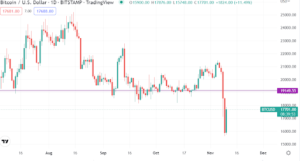I published an analysis three weeks ago outlining that I feared Bitcoin was one bad news event from a plunge down towards $15,000.
And hell, did we get that event.
Now I didn’t quite predict this. My piece made no reference to anything to do with FTX. Not only that, but I have waxed lyrical in the past about Bankman-Fried’s acumen. I misread his character massively, and I was very wrong.
In an examination of FTX’s solvency published on Monday morning, I still believed it was highly unlikely that FTX were insolvent.
I have also gone on record many a time repeating the same old adage: playing with Bitcoin in the short-term is akin to spinning a roulette wheel.
But as we hung around $20,000, and headed into a winter awash with ominous variables like an energy crisis, high inflation, a nasty geopolitical climate and political upheaval in the US, UK and in many nations across Europe, risk was extremely high.
And then an extraneous variable – FTX imploding. And in the words of the wonderful Black Eyed Peas, “it’s going down now and not a tad bit later”.
Is it time to buy the dip?
I don’t like this question for two reasons.
The first is that, being a random boy on the Internet, how am I meant to know? Like I said a few sentences ago, betting short-term on Bitcoin is like spinning a roulette wheel. My opinion on whether I fancy red or black would be just as valid as to what I think about Bitcoin’s short-term action will be.
The second reason is that this question is almost a muscle-memory reaction to crypto prices falling. Born out of the culture in the space, I suppose. Central to it is people pointing to past cycles and referencing how Bitcoin has always returned. But they fail to realise something.
Bitcoin was launched in January 2009, into one of the longest and most explosive bull runs in history. As of this year, that is no longer the case. The free money has been turned off – then Federal Reserve raising interest rates at historically fast rates, with inflation at levels not seen since the 70’s.
This is the first time that Bitcoin has ever experienced a wider economy bear market. And for that reason, all bets are off. And it is now trading at levels lower than it was five years ago in December 2017.
There is no such thing as buying dips and laughing your way to the bank. A glance at the above chart will show quite how many dips there have been this year. This thing is hard. Trading is hard. Crypto is a volatile game. For every screenshot of 100X gains you see on Twitter, there are 100 more people who lost it all.
Don’t take eyes off wider economy
FTX imploding is wild. And it’s incredibly bearish for the crypto economy at large. Expect some contagion to ripple out of this, as we don’t know yet who was exposed to who – but FTX, as such a large player in the industry, will no doubt drag a few bodies down with them.
But don’t take your eyes off the bigger trend. Crypto is following the stock market. Blue chip assets like Bitcoin and Ethereum are the tail on the dog, with the dog being the stock market. And that stock market is oscillating back and forth over inflation readings and the Federal Reserve’s approach to interest rates.
I wrote last month about how this correlation between stocks and Bitcoin is as high as it has ever been. It picked up markedly in April 2022, right as we transitioned to this high-interest rate environment.
In the short-term, this FTX episode needs to play out. Contagion will ripple, news will break, surprises will come out. And then after that, it’s back to watching the stock market. If it wasn’t clear already – the crypto markets are merciless. Don’t forget that, and stay safe.
The post FTX insolvent – what next for crypto? appeared first on CoinJournal.

